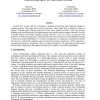Free Online Productivity Tools
i2Speak
i2Symbol
i2OCR
iTex2Img
iWeb2Print
iWeb2Shot
i2Type
iPdf2Split
iPdf2Merge
i2Bopomofo
i2Arabic
i2Style
i2Image
i2PDF
iLatex2Rtf
Sci2ools
104
click to vote
CSEE
2008
Springer
2008
Springer
Improving Knowledge Acquisition in Capstone Projects Using Learning Spaces for Experiential Learning
Students have to cope with new technologies, changing environments, and conflicting changes in capstone projects. They often lack practical experience, which might lead to failing to achieve a project's learning goals. Reusing experiences from other students provides a first step towards building up practical knowledge and implementing experiential learning in higher education. In order to further improve knowledge acquisition during experience reuse, we present an approach that generates so-called learning spaces, which automatically enrich experiences with additional learning content and contextual information. To evaluate our approach, we conducted a controlled experiment that showed a statistically significant improvement for knowledge acquisition by 204% compared to conventional experience descriptions. From a technical perspective, the approach provides a good basis for future applications that support learning at the workplace in academia and industry.
Related Content
| Added | 19 Oct 2010 |
| Updated | 19 Oct 2010 |
| Type | Conference |
| Year | 2008 |
| Where | CSEE |
| Authors | Eric Ras, Jörg Rech |
Comments (0)

